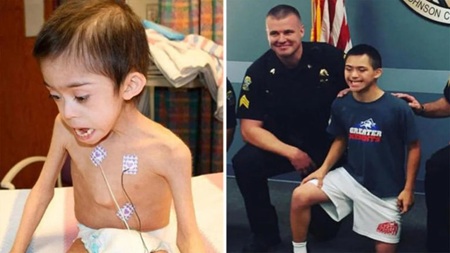
In 2010, a shocking and heartbreaking case emerged from a small Kansas community:
a young boy with Down syndrome had been found in the attic of his own home, starving, neglected, and abandoned by the very person who was supposed to care for him.
Giovanni “Govi” Eastwood was only six years old at the time, yet his body was frail and underdeveloped, weighing no more than a three-year-old child.
His condition was so severe that medical experts later confirmed that he would not have survived much longer if he had not been rescued that night.
Govi’s mother, Rachel Perez, had been taken into custody due to outstanding warrants. Authorities quickly located and removed Govi’s two older siblings, ensuring their safety, but Govi himself was left behind.
Initially, Perez provided false information about his whereabouts, misleading the officers. Sergeant John Klingele, who was part of the team investigating the home, later recalled, “She concocted some story about where Govi was.
So they all ended up leaving, and Govi was still there.” The officers had a suspicion that the boy was still inside the house, so they returned to the property to investigate further.
After calling out and carefully checking, they discovered him hidden away in the attic, alone and in terrible condition.
The sight of Govi shocked everyone. “He looked like a kid out of a concentration camp, skin and bones,” Sergeant Klingele remembered. “We were told he was going to be seven, but size-wise he looked maybe three.”
At just 17 pounds, he could not walk and barely spoke. His body was covered in filth, malnourishment had caused hair loss, and his bones were brittle and bowed due to rickets.
The fatty tissue that should have cushioned and protected him had completely wasted away. There were no blankets, no toys, and no sign that anyone had attended to his basic needs.
Authorities later concluded that his mother had intentionally hidden him in the attic, leaving him neglected and forgotten for extended periods of time.
Medical professionals confirmed the severity of his condition. Govi’s malnutrition and neglect were life-threatening. His body was fragile, his immune system weak, and his chances of survival without immediate intervention were minimal.
Rachel Perez was ultimately charged and sentenced to an eight-year prison term for attempted murder related to the treatment of her son.
The legal consequences were a small measure of justice, but they could never undo the trauma that Govi endured.
After his rescue, Govi was placed in the care of his great aunt and uncle, Stacy and Joe Eastwood, who adopted him along with his two sisters. The process of recovery was long and difficult.
Initially, Govi exhibited symptoms of severe trauma: he would sleep on the floor out of fear of being hurt, he flinched at sudden movements, and even simple gestures like a high five made him anxious.
Slowly, with patience, love, and consistent care, Govi began to trust his new family and adjust to life in a safe environment. Over time, he began to thrive, gaining weight, strength, and confidence.
By 2016, six years after his rescue, the officers who had discovered Govi returned to meet him again. The transformation was astonishing. The once frail, fearful boy had grown into a healthy, joyful 12-year-old with a radiant personality.
He was confident, affectionate, and full of life—a living testament to the power of love and second chances. During his visit to the Sheriff’s Department, Govi was honored as an honorary deputy and awarded a commemorative plaque.
He shook hands with the officers who had saved him and expressed heartfelt gratitude. Sergeant Klingele reflected, “That boy is the hero. Seeing how big his heart is and his smile is… it’s really good to see him.”
According to his great aunt, Govi slept with the plaque that night, treasuring it as a symbol of the life he had been given.
Govi’s story is both tragic and inspiring. The thought that a parent could neglect and abuse a child in such a manner is nearly impossible to comprehend.
Yet Govi’s survival and subsequent recovery show the incredible resilience of the human spirit, the profound impact of intervention, and the transformative power of love.
In the years following his rescue, he has continued to grow stronger, both physically and emotionally. His confidence and personality shine through, inspiring everyone who meets him.
The impact of his story reaches far beyond his family and the officers who saved him. It has served as a powerful reminder of the importance of vigilance, compassion, and advocacy for vulnerable children.
The community that once mourned for the frail boy they found in the attic now celebrates his life and resilience.
Each milestone Govi achieves—from simple acts of independence to moments of joy and laughter—is a triumph over the unimaginable suffering he endured as a child.
Govi’s story also illustrates the remarkable bond between children and the adults who fight for their safety.
The officers who found him that night, who returned to ensure he was truly safe, and who later reunited with him, witnessed firsthand how a child can transform when given love and stability.
Stacy and Joe Eastwood, his adoptive parents, have devoted themselves to providing the nurturing environment that Govi and his sisters deserve, ensuring that the trauma of the past does not define their futures.
Today, Govi continues to flourish in his forever home. His personality has blossomed, and he radiates warmth, joy, and kindness to everyone around him.
Friends, family, and community members marvel at the resilience, courage, and inner strength he displays every day.
He remains a living symbol of hope, proving that even in the darkest situations, intervention, love, and care can give a child a second chance at life.
Govi’s journey reminds us all that no matter how dire circumstances may seem, hope can prevail. It demonstrates that the smallest acts of vigilance, compassion, and intervention can save lives and change destinies.
While his early years were marked by neglect and suffering, his future is filled with promise, love, and opportunity.
Every smile he shares, every step he takes, and every achievement he celebrates is a victory over the neglect and abuse he once endured.
The story of Giovanni “Govi” Eastwood should be shared widely, not only to honor his incredible journey and celebrate his life, but also to inspire action and awareness for children everywhere who may be at risk.
It is a story of resilience, recovery, and the extraordinary capacity of the human spirit to heal when surrounded by love. Govi’s life is proof that even after the darkest experiences, children can thrive when they are protected, nurtured, and cherished.
In 2010, a shocking and heartbreaking case emerged from a small Kansas community:
a young boy with Down syndrome had been found in the attic of his own home, starving, neglected, and abandoned by the very person who was supposed to care for him.
Giovanni “Govi” Eastwood was only six years old at the time, yet his body was frail and underdeveloped, weighing no more than a three-year-old child.
His condition was so severe that medical experts later confirmed that he would not have survived much longer if he had not been rescued that night.
Govi’s mother, Rachel Perez, had been taken into custody due to outstanding warrants. Authorities quickly located and removed Govi’s two older siblings, ensuring their safety, but Govi himself was left behind.
Initially, Perez provided false information about his whereabouts, misleading the officers. Sergeant John Klingele, who was part of the team investigating the home, later recalled, “She concocted some story about where Govi was.
So they all ended up leaving, and Govi was still there.” The officers had a suspicion that the boy was still inside the house, so they returned to the property to investigate further.
After calling out and carefully checking, they discovered him hidden away in the attic, alone and in terrible condition.
The sight of Govi shocked everyone. “He looked like a kid out of a concentration camp, skin and bones,” Sergeant Klingele remembered. “We were told he was going to be seven, but size-wise he looked maybe three.”
At just 17 pounds, he could not walk and barely spoke. His body was covered in filth, malnourishment had caused hair loss, and his bones were brittle and bowed due to rickets.
The fatty tissue that should have cushioned and protected him had completely wasted away. There were no blankets, no toys, and no sign that anyone had attended to his basic needs.
Authorities later concluded that his mother had intentionally hidden him in the attic, leaving him neglected and forgotten for extended periods of time.
Medical professionals confirmed the severity of his condition. Govi’s malnutrition and neglect were life-threatening. His body was fragile, his immune system weak, and his chances of survival without immediate intervention were minimal.
Rachel Perez was ultimately charged and sentenced to an eight-year prison term for attempted murder related to the treatment of her son.
The legal consequences were a small measure of justice, but they could never undo the trauma that Govi endured.
After his rescue, Govi was placed in the care of his great aunt and uncle, Stacy and Joe Eastwood, who adopted him along with his two sisters. The process of recovery was long and difficult.
Initially, Govi exhibited symptoms of severe trauma: he would sleep on the floor out of fear of being hurt, he flinched at sudden movements, and even simple gestures like a high five made him anxious.
Slowly, with patience, love, and consistent care, Govi began to trust his new family and adjust to life in a safe environment. Over time, he began to thrive, gaining weight, strength, and confidence.
By 2016, six years after his rescue, the officers who had discovered Govi returned to meet him again. The transformation was astonishing. The once frail, fearful boy had grown into a healthy, joyful 12-year-old with a radiant personality.
He was confident, affectionate, and full of life—a living testament to the power of love and second chances. During his visit to the Sheriff’s Department, Govi was honored as an honorary deputy and awarded a commemorative plaque.
He shook hands with the officers who had saved him and expressed heartfelt gratitude. Sergeant Klingele reflected, “That boy is the hero. Seeing how big his heart is and his smile is… it’s really good to see him.”
According to his great aunt, Govi slept with the plaque that night, treasuring it as a symbol of the life he had been given.
Govi’s story is both tragic and inspiring. The thought that a parent could neglect and abuse a child in such a manner is nearly impossible to comprehend.
Yet Govi’s survival and subsequent recovery show the incredible resilience of the human spirit, the profound impact of intervention, and the transformative power of love.
In the years following his rescue, he has continued to grow stronger, both physically and emotionally. His confidence and personality shine through, inspiring everyone who meets him.
The impact of his story reaches far beyond his family and the officers who saved him. It has served as a powerful reminder of the importance of vigilance, compassion, and advocacy for vulnerable children.
The community that once mourned for the frail boy they found in the attic now celebrates his life and resilience.
Each milestone Govi achieves—from simple acts of independence to moments of joy and laughter—is a triumph over the unimaginable suffering he endured as a child.
Govi’s story also illustrates the remarkable bond between children and the adults who fight for their safety.
The officers who found him that night, who returned to ensure he was truly safe, and who later reunited with him, witnessed firsthand how a child can transform when given love and stability.
Stacy and Joe Eastwood, his adoptive parents, have devoted themselves to providing the nurturing environment that Govi and his sisters deserve, ensuring that the trauma of the past does not define their futures.
Today, Govi continues to flourish in his forever home. His personality has blossomed, and he radiates warmth, joy, and kindness to everyone around him.
Friends, family, and community members marvel at the resilience, courage, and inner strength he displays every day.
He remains a living symbol of hope, proving that even in the darkest situations, intervention, love, and care can give a child a second chance at life.
Govi’s journey reminds us all that no matter how dire circumstances may seem, hope can prevail. It demonstrates that the smallest acts of vigilance, compassion, and intervention can save lives and change destinies.
While his early years were marked by neglect and suffering, his future is filled with promise, love, and opportunity.
Every smile he shares, every step he takes, and every achievement he celebrates is a victory over the neglect and abuse he once endured.
The story of Giovanni “Govi” Eastwood should be shared widely, not only to honor his incredible journey and celebrate his life, but also to inspire action and awareness for children everywhere who may be at risk.
It is a story of resilience, recovery, and the extraordinary capacity of the human spirit to heal when surrounded by love. Govi’s life is proof that even after the darkest experiences, children can thrive when they are protected, nurtured, and cherished.




